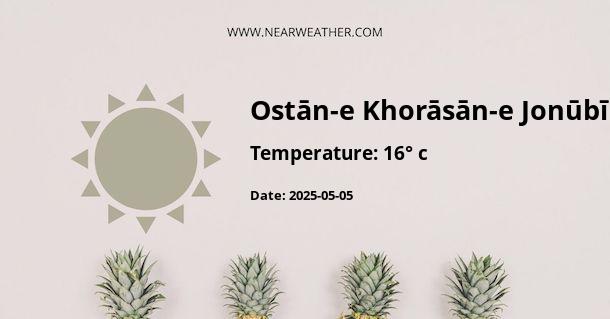Ostān-e Khorāsān-e Jonūbī, Iran: Climate and Weather Overview
Ostān-e Khorāsān-e Jonūbī, located in northeastern Iran, experiences a diverse climate with a mix of continental and arid influences. The region is known for its unique weather patterns, which include hot summers, cold winters, and limited precipitation throughout the year. Understanding the climate and weather patterns of Ostān-e Khorāsān-e Jonūbī is essential for residents, travelers, and those interested in the region's environmental characteristics.
Annual Climate Overview
Ostān-e Khorāsān-e Jonūbī exhibits a continental climate, characterized by distinct seasonal variations in temperature and precipitation. The region experiences hot, dry summers and cold winters, with limited rainfall spread throughout the year. The climate can be further understood by analyzing the average temperature and precipitation for each season.
Summer (June to August)
| Month | Average High (°C) | Average Low (°C) | Precipitation (mm) |
|---|---|---|---|
| June | 32 | 16 | 3 |
| July | 35 | 19 | 2 |
| August | 34 | 18 | 3 |
During the summer months, Ostān-e Khorāsān-e Jonūbī experiences high temperatures, with average highs ranging from 32°C to 35°C. Nighttime temperatures provide some relief, dropping to average lows between 16°C and 19°C. Precipitation is minimal during this season, with an average of 2-3mm per month.
Winter (December to February)
| Month | Average High (°C) | Average Low (°C) | Precipitation (mm) |
|---|---|---|---|
| December | 6 | -4 | 6 |
| January | 4 | -6 | 8 |
| February | 7 | -4 | 8 |
Winter brings cold temperatures to Ostān-e Khorāsān-e Jonūbī, with average highs ranging from 4°C to 7°C and lows from -6°C to -4°C. Precipitation increases during the winter months, with an average of 6-8mm per month, contributing to the region's annual rainfall.
Annual Weather Patterns and Climate Extremes
It's important to note that Ostān-e Khorāsān-e Jonūbī experiences climate extremes that can impact daily life and local ecosystems. Understanding these patterns can help residents and visitors prepare for various weather conditions throughout the year.
Temperature Extremes
The highest recorded temperature in Ostān-e Khorāsān-e Jonūbī can reach well above 40°C during the peak of summer, while winter temperatures can plummet to below freezing. These temperature extremes require residents to adapt to significant changes in their daily routines and agricultural practices.
Precipitation Variability
Ostān-e Khorāsān-e Jonūbī experiences limited precipitation, with most of the annual rainfall occurring in the winter months. This variability in precipitation can impact water resources, agricultural yields, and overall environmental stability in the region.
Wind and Dust Storms
As with many arid and semi-arid regions, Ostān-e Khorāsān-e Jonūbī is susceptible to wind and dust storms, particularly during the dry season. These weather phenomena can pose challenges to transportation, air quality, and public health, requiring proactive measures to mitigate their impact.
Impacts of Climate on Local Activities
The climate of Ostān-e Khorāsān-e Jonūbī plays a significant role in shaping local activities, livelihoods, and cultural practices. Understanding these impacts is crucial for residents and visitors alike.
Agriculture and Livelihoods
The region's climate influences agricultural practices, with farmers adapting to limited water resources and seasonal temperature fluctuations. Traditional crops and livestock management are closely tied to the local climate, with sustainability practices evolving to mitigate environmental challenges.
Outdoor Recreation and Tourism
Ostān-e Khorāsān-e Jonūbī's climate shapes opportunities for outdoor recreation and tourism. While summer offers warmer weather for outdoor activities, winter invites unique experiences such as winter sports and cultural festivities tied to the season's weather patterns.
Infrastructure and Urban Planning
Local infrastructure and urban planning efforts are influenced by Ostān-e Khorāsān-e Jonūbī's climate, with considerations for temperature extremes, precipitation variability, and the management of dust storms. Sustainable development practices aim to enhance resilience and adaptability to the region's environmental conditions.
Conclusion
Ostān-e Khorāsān-e Jonūbī's climate and weather patterns underscore the dynamic nature of the region's environmental conditions. From temperature extremes to precipitation variability, understanding these factors is crucial for adapting to daily life, preserving ecosystems, and fostering sustainable development. As the region continues to evolve, ongoing research and local initiatives will play a key role in addressing the challenges and opportunities presented by Ostān-e Khorāsān-e Jonūbī's climate.
A - Ostān-e Khorāsān-e Jonūbī's Latitude is 32.500000 & Longitude is 59.500000.
A - Weather in Ostān-e Khorāsān-e Jonūbī is 11° today.
A - Climate Conditions in Ostān-e Khorāsān-e Jonūbī shows light rain today.
A - Humidity in Ostān-e Khorāsān-e Jonūbī is 61% today.
A - Wind speed in Ostān-e Khorāsān-e Jonūbī is 24.23 km/h, flowing at 245° wind direction. today.
